- Home
- David Pilling
The Hooded Men
The Hooded Men Read online
LONGSWORD IV:
THE HOODED MEN
By David Pilling
Glossary
Bataille – Battle or battalion of cavalry
Conroi – a group of five to ten knights
Destrier – a knightly war horse
Hauberk – full-length mail tunic
Haubergeon – shorter version of the hauberk
Kettle hat – a type of helmet with a wide brim
Rouncie – a common riding horse
Sergeant – a common mounted soldier
Vintner – infantry officer
1.
Chartley Castle, Staffordshire, 1273
They came at dead of night. A hundred men on foot guided by the swollen white orb of the moon, hanging in a black velvet sky.
The castle reared above them, whitewashed ramparts and half-round towers. Watch fires glimmered along the battlements. On the turrets of the gatehouse, twin banners flapped lazily in the night breeze.
Robert Ferrers, the leader of the band, gestured at his men to get down. They silently crouched in the wet grass. He could hear their quickened breath, sense their excitement. Every man strained at the leash, like a brace of deerhounds in sight of their prey.
He held them in the palm of his hand. These were diehards: loyalists who had stuck by him through every rise and dip in fortune. If he told them to murder a child, they would do it. The men of Ferrers did not ask questions. They simply obeyed.
He ground his teeth at the sight of the banners on the gatehouse. They were of red silk, emblazoned with the twin white lions of Lestrange, lords of Knockin. The Lestranges were king’s men and Chartley was now a royal castle, garrisoned by their soldiers. The royal banner flew from the top of the keep, a circular great tower set high on the motte.
“Make ready,” Robert hissed under his breath. His men quickly spread out into two staggered lines. Between them they carried half a dozen scaling ladders. Others carried grapnels.
Robert had a spy inside the castle, a young page boy who worked in the kitchens, allowed to come and go as he pleased. For the past six weeks he had fed information to Robert on the state of the garrison. The castle was defended by twenty archers and five crossbowmen. They had enough supplies to last three months, so direct assault was out of the question.
The earl had other ideas. He peered closely at a section of wall between two of the half-round towers. He knew this castle like the back of his hand. Beyond the wall lay the inner ward and the shortest route to the keep. If his men got inside and cut off the defenders before they could shut themselves up inside the impregnable great tower, Chartley would be his.
First, a long sprint across open ground and then a scramble up the steep bank to the foot of the curtain wall. His followers were drilled to move quickly and silently, but there was always the danger of being spotted. Then the shafts would fly.
Robert steeled himself. He wore no helm, though the light mail shirt under his grey cloak protected him against arrows. A crossbow bolt would punch right through it.
I must lead these men, he thought. I cannot be seen to fail. I must swallow my fear. Resist it. Hide it.
He was rotten with fear. Robert could sense it rising inside him, from the deepest pit of his soul. Yet he had to make a show of courage. Either that or lose his inheritance forever. He feared shame more than death or bitter wounds. The fear of shame compelled him to draw his sword and give the signal to attack.
“Forward!”
His men rose and charged towards the massive silhouette of the castle. Robert struggled to keep up. Pain shot through his legs. Along with a fierce temper, he had inherited the family curse of gout.
The motte was guarded by a ditch, seven feet deep. Robert had planned for this, and his men laid their ladders across it before scrambling over on all fours. He stared anxiously at the watch fires on the battlements, high above. There was no sign of activity. Not a sound. The sentries were either asleep or drunk.
In spite of the fear coursing through his veins, Robert grinned. He had picked a cold night for the assault, with a chill mist rising off the ground. Any sensible man who poked his nose out of doors would soon withdraw it again, back to the comfort of a warm fire and a pitcher of mulled ale.
“On!” he hissed impatiently, gesturing at the stragglers to get across the ditch. “Now is the moment – hesitate, and we’re lost!”
Once the last man was over, he crawled over himself, staring down at the chasm below. His younger brother, William, had once lost control of his horse and allowed the beast to gallop straight into the ditch. She broke her foreleg and had to be put down. Their father, the old earl, had beaten William until his back ran with blood. His futile howls for mercy still echoed down the years.
Robert shut them out. This was not the time to dwell on the past. Ferrers senior was long dead, drowned after his litter overturned on a bridge and pitched the gout-ridden old man into the Trent.
Good riddance to the brute.
Panting, he laboured up the slope. It was stripped bare of plant and tree-growth, so the defenders had a clear shot at anyone who tried to climb it. Robert used his sword as a crutch, piercing the ground with the tip to help him up the incline. The swelling and pain in his joints was almost unbearable, as though his feet were on fire. He bit down on his tongue to stop himself screaming.
Why in hells didn’t I have myself bled?
Finally he reached the wall. Robert turned over and slumped against the rough masonry to catch his breath. He shook like a man in the grip of a fever, his entire body bathed in sweat.
Fortunately his men knew their business. They were urged on by his brother William, a natural athlete who had avoided the family curse. He swarmed up the first scaling ladder and was challenged from above.
“Halt, there! Halt, I say!”
Archers in black cloaks, placed under the ladders to cover the ascent of their comrades, took aim and loosed at the speaker. Most of their arrows clattered harmlessly off the stonework. One found its mark. There was a yelp, and seconds later a muffled thump as the sentry’s body hit the ground.
More shouts rippled along the battlements. There was nothing for it now. Robert pushed himself off the wall, limped to the nearest ladder and started to climb.
Two men were ahead of him, dark cloaks flapping in the breeze. Somewhere inside the castle a bell started to clang. His men reached the battlements and leaped nimbly onto the walkway. Their swords flamed into being. Steel crunched as they exchanged blows with the sentries.
Robert spotted a crossbowman on the tower to the left, taking careful aim at one of the hooded figures in black cloaks.
“Beware!” he shouted. Too late. The bolt hit his man in the spine. He screamed, threw his head back, and was stabbed in the throat.
Fighting erupted as more of Ferrers’s men swarmed over the battlements. The bell was joined by a drum, summoning the garrison to arms. Shouts and oaths rippled down the length of the wall.
Robert heaved himself onto the walkway. Nearby a dying guardsman lay slumped against the parapet. Blood sheeted down his tunic from a hole in his throat. The white lions on his chest were stained with blood, more of the stuff pooled in his crotch. His eyelids flickered as life slowly drained out of him.
“For your death alone,” Robert panted, “I stand condemned as a traitor. Not much comfort, I expect.”
He got up and limped carefully down the stair to the inner ward – the same steps he scrambled up and down countless times in his boyhood, before the onset of gout.
The battle for the castle was brief. Taken by surprise, the frightened and outnumbered defenders had little stomach for a fight. After a few were killed, the rest threw down their swords.
“Spare them,” Robert or
dered. “I will not turn the home of my ancestors into a charnel house.”
Only the constable refused to surrender. In only his nightshirt, he wielded a broadsword with deadly skill, surrounded by a ring of hooded men. Three went down under his blade before the rest gave back.
Robert recognised the constable’s thin, unshaven face. “Sir Hamo,” he said. “Put up your sword. I have no taste for your blood.”
Hamo Lestrange growled in the back of his throat.
“Devil take you, Robert Ferrers!”
With that, Hamo threw down his sword and folded his arms. Mightily relieved – he didn’t want the death of a lord on his account, never mind common soldiers – Robert hobbled over to accept Hamo’s surrender.
One of his men scooped up the fallen sword and handed it to him. Robert held the blade flat against his palm. All his fears melted away under the touch of steel. An exultant glow filled him, heady as strong wine on an empty stomach.
“You stole my castle, Hamo,” he said. “It is only right I should take it back.”
The other man snorted. His family were barons of the Welsh March, a wild and virtually lawless land where the king’s writ barely ran. Selfish, cruel and grasping, they had carved out a lordship at sword-point and held it in the same manner.
Of all his kin, Hamo was said to be one of the worst. A fine soldier and rough rider, like most Marchers, but utterly without scruple.
“You did well, Ferrers,” he said grudgingly. “Enjoy your little victory while it lasts. You won’t hold Chartley long. Once the council in London learns of it, an army will come marching into Staffordshire to take it back. Prince Edmund will have your head this time. I look forward to watching it rot on a spike.
“Do you hear me?” Hamo shouted at Robert’s men. “Your lord is doomed, and means to drag you down to Hell with him! May as well cut your own throats, lads, because you’re all dead men anyway!”
They cursed and spat at him. One, a hulking figure with a white sword-slash across one cheek, drew his knife and advanced on Hamo. Robert pushed him back.
“I’m not such a fool,” he said. “I have friends, Hamo. Powerful friends. You’ll see. A war is coming.”
Hamo looked unimpressed. “Dig your own grave. If the council doesn’t destroy you, the king will.”
“I look forward to his return,” Robert spat. “We have a warm welcome all prepared.”
Anger rose inside him. Black bile. He hated his cousin Edward, now King of England since the death of his father, more than any other man alive. They had been deadly rivals since their youth. Time, and Edward’s long absence on crusade, had not lessened Robert’s hatred or desire for revenge. He would carry the grudge until one of them was dead.
For now, there was the question of what to do with his prisoner. The other man had anticipated the question.
“You will allow me to set my ransom,” said Hamo.
Robert had a surprise for him. “No,” he replied, and almost smiled at the flicker of alarm on Hamo’s cruel features. “Don’t fret, Hamo. The last thing I want is a feud with your kin. I want you to carry a message to the council. Tell them Robert Ferrers, rightful Earl of Derby, has taken back the first piece of his stolen inheritance. Tell them a storm is coming.”
He raised his voice slightly. “It will not blow over until my lands are restored and every one of my men is given a free pardon!”
This was guaranteed to raise a cheer, and so it did. Every one of his followers had been outlawed as punishment for rebellion, their lands taken away and given to royalists. They looked to him as their lord – even though he was himself broken and landless – for salvation.
“Very well,” sneered Hamo when the noise had died down. “I’ll be your errand boy. Perhaps you will let me dress first? I would not walk all the way to London in my nightshirt.”
Robert picked out two men. “Escort Sir Hamo to his chambers,” he ordered them. “When he is dressed, take him to the stables and pick out a horse for his journey.”
Hamo strode away between his guards. He threw a parting jibe over his shoulder.
“Much obliged, my lord. I look forward to meeting you on the field. Don’t expect the same consideration.”
Robert ignored this and looked around at his castle. He spotted the approach of William, wiping the blood from his sword with a cloth.
“Good to be home again, eh?” said the latter. Robert smiled fondly at his brother.
“Yes. But this is just the start. I lost everything, William. It is my duty to get it back. All our lands in Stafford, Derby, Leicester, Nottingham. All of it.”
He spoke firmly, and meant every word. The war had only just begun.
2.
The cog Saint Michael crossed safely from Calais and weighed off the coast of Dover. It was a blustery morning in late spring. A strong wind blew from the north, churning up the grey waters. Gulls skimmed and whirled overhead, wings outspread, buoyed on the air currents. Every so often one would launch a sudden dive and vanish into the sea, to emerge with a wriggling silver fish clenched in its beak.
Hugh Longsword envied their freedom. Never a good sailor, he clung to a rope and leaned over the side, sick and light-headed. The voyage was swift and smooth, but he had still retched several times into the Channel.
At least, he told himself, it was nowhere near as bad as the storm that hit the English fleet outside Acre. The memory of being stuck inside the hold of the royal flagship, awash with vomit and men praying for death, would stay with him forever.
“Thank God. I thought never to see those cliffs again.”
The voice belonged to Richard Giffard, Hugh’s companion. He stood by the prow, holding onto a rope, and shaded his eyes to stare at the rocky bluffs.
Richard was a young squire of the Lord Edward’s household. Criminally young, in Hugh’s opinion. Nobody had any business being eighteen years old and impossibly handsome with it. Richard possessed the face of an angel, framed by a carefully combed mane of crisp golden curls. He was also blessed with a lithe frame, wasp waist and broad shoulders.
A form like mortal sin and a mind to match, Hugh thought cynically.
Girls (and boys) fell over themselves to get at this Adonis. Then there were all the unpaid landlords, cheated creditors and outraged fathers. Richard was supposed to serve as Hugh’s bodyguard, but in practice it was more the other way round. How many times, during the long months of their journey back from Outremer, had he plucked the boy’s fat out of the fire? Richard left a trail of chaos behind him from the shores of the Latin east, all the way through the Holy Roman Empire and France. Any man with a grain of sense would have left this reckless young tyro to his fate.
Unfortunately, and to his own amazement, Hugh liked him. There was more than a touch of envy, too, as he watched Richard wallow in his riotous youth. Though he was past thirty, and really ought to know better, Hugh found himself joining in. Why in hells not? His life so far had been all duty and danger. The world owed him a bit of pleasure.
Hugh glanced up at the white wall looming above their heads. Beyond the cliffs rose Dover Castle, the gateway to southern England. The king’s banner rippled from every turret, slashes of red and gold against dismal morning skies.
He couldn’t deny it was a relief to be back. Like his companion, he had thought never to see England again. It often depressed his spirits during long, deathly cold nights in the Holy Land. To never walk among green fields and quiet woodlands, sit in an ale-house, feel the gentle patter of English rain on his face.
“God has granted us a stay of execution,” he murmured, clutching his empty stomach as the ship rolled under him. “Let us make best use of it.”
Richard grinned and rubbed his hands together. He had the exquisite poise of a dancer and never showed any ill-effects of being at sea.
“Agreed!” the young man exclaimed. “As soon as we get ashore, let’s find the best tavern in Dover, and the most expensive brothel. Or the other way round, if you prefer.”
Hugh shuddered. “You may debauch into the small hours,” he said weakly. “I’m in no fit state for anything save a bowl of gruel and an early night. We’ll find some hostel with separate chambers for us both.”
Richard laughed and clapped him on the arm, almost knocking him off his feet. “You love to play the weary old man, eh? I know you, Hugh Longsword. You may be getting on in years, but there’s still fire in your belly. It’s a case of fanning the flames.”
“Master Longsword,” Hugh replied irritably. Richard was technically his servant, and sometimes needed reminding. “As for my belly, it has never been emptier. God curse all ships and sailing. I shall never set foot aboard another boat for the rest of my days. I swear it. Never!”
Richard laughed again, a little more uncertainly this time. For such a spirited youth, he could be surprisingly easy to intimidate. Otherwise Hugh might have lost control of the boy months ago.
The captain of the Saint Michael, a grizzled and typically capable mariner of Bayonne, barked at them to get into the longboat. Hugh had to be helped over the side and then lowered down on a rope, gasping as the cog pitched and heaved in the gentle swell. Richard climbed nimbly down the short ladder and dropped the last few feet, to land (as ever) on his feet.
Four burly oarsmen rowed them to shore. Hugh, desperate to get away from boats, gathered his strength and heaved himself overboard. After a few seconds he emerged like a sickly Neptune, spluttering and gasping and wiping saltwater from his eyes.
“There,” he cried over the laughter of the men in the boat, Richard included. “I am renewed!”
After paying off the sailors, the two men trudged ashore and made their way up a narrow path from the beach to the town, nestled under the castle. The whitewashed walls of the famous stronghold reared above them, shining like pale diamond.
Hoofbeats sounded ahead. A mounted patrol appeared on the ridge, six horsemen on the summit of the path. Hugh gave them a weary salute and dug out a sealed oilskin packet from the drawstring pouch at his belt. Inside the packet was a roll of parchment, which he brandished at the patrol.

 The Growth Delusion
The Growth Delusion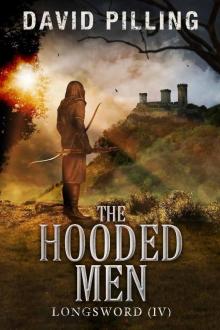 The Hooded Men
The Hooded Men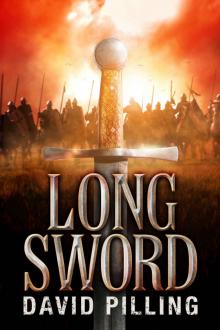 Longsword
Longsword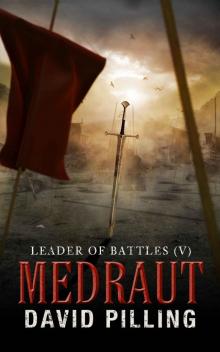 Medraut
Medraut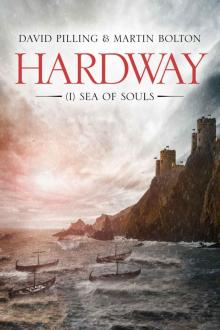 Hardway
Hardway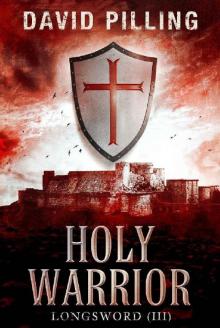 Holy Warrior
Holy Warrior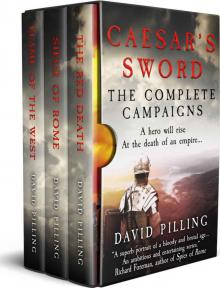 Caesar's Sword: The Complete Campaigns
Caesar's Sword: The Complete Campaigns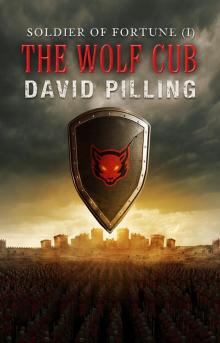 The Wolf Cub
The Wolf Cub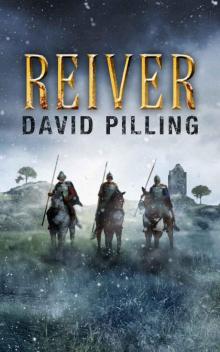 Reiver
Reiver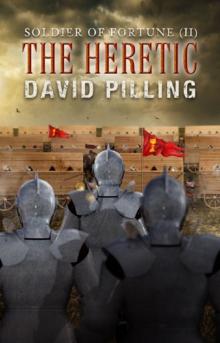 The Heretic
The Heretic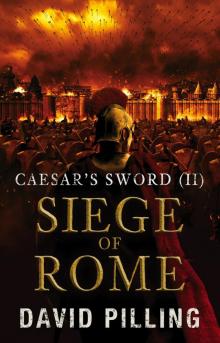 Siege of Rome
Siege of Rome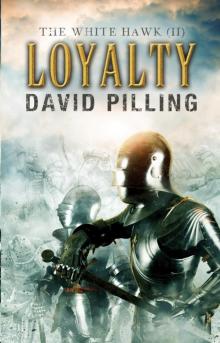 Loyalty
Loyalty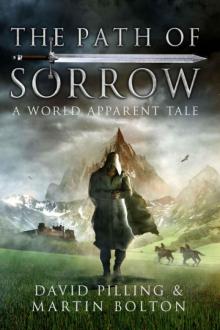 The Path of Sorrow
The Path of Sorrow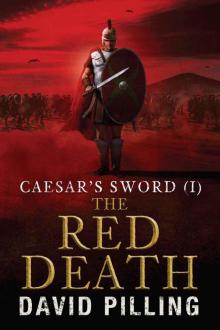 Caesar's Sword (I): The Red Death
Caesar's Sword (I): The Red Death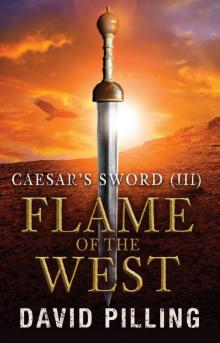 Flame of the West
Flame of the West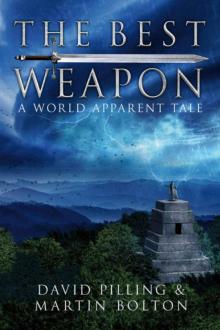 The Best Weapon
The Best Weapon Sacrifice
Sacrifice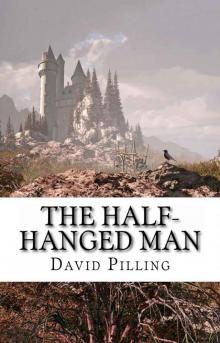 The Half-Hanged Man
The Half-Hanged Man